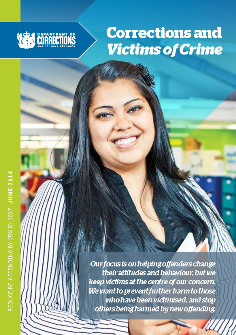Corrections and Victims of Crime brochure
Our focus is on helping offenders change their attitudes and behaviour, but we keep victims at the centre of our concern. We want to prevent further harm to those who have been victimised, and stop others being harmed by new offending.
To find out more:
- pick up a printed copy of this brochure at our probation sites and prison visits centres;
- download the Corrections and Victims of Crime (PDF 919KB) brochure; or
- view the brochure online:
 Providing information
Providing information
Keeping victims informed is a responsibility that Corrections shares with the Police, the New Zealand Parole Board, and the Ministry of Health.
People living with the aftermath of crime often want to know what happens to the offender involved.
It’s our duty to provide appropriate and accurate information in a sensitive and timely way.
Victim notification register
Corrections manages a national victim notification register (VNR). The register is for people affected by specified types of serious offending who choose to receive information about the person who has offended against them or their family.
Not all victims can be on the register, and not all offenders are subject to the register.
The Police assess and approve victim applications under the Victims’ Rights Act 2002. Then victims are advised in writing that they are registered.
Our co-ordinators take care not to contact victims around sensitive dates such as anniversaries of the offending or the victim’s birthday.
Other support for Victims
Sometimes registered victims want more information than Corrections is able to provide. But if we can’t help with an enquiry we refer it to local support agencies including Victim Support (0800 VICTIM), NZ Police, and Victim Advisers at Court.
How notification works
Corrections notifies registered victims only about offenders who are:
- in prison (including those remanded in custody)
- released from prison on court imposed conditions or parole
- on home detention and post detention conditions
- serving an extended supervision order.
Legislation limits the type of information that can be provided.
A registered victim is notified when the offender is released from prison or released to work, has an unescorted temporary release, or is at the end of a home detention sentence. The victim is also notified if the offender escapes from prison or leaves their home detention residence without approval, breaches their release conditions or extended supervision conditions, is recalled to prison, the offender’s sentence is cancelled and substituted with another sentence, and if the offender dies.
The Ministry of Health is responsible for notifying registered victims about offenders held in psychiatric hospitals.
The New Zealand Parole Board is responsible for notifying registered victims about the parole process for offenders
sentenced to more than two years in prison.
Restorative justice
Restorative justice is another way Corrections works to support victims. This voluntary process provides a safe forum for offenders to meet with the people they have harmed through their offending.
Restorative justice requires offenders to take responsibility for what they have done before participating in a conference. The restorative justice process involves a meeting between the offender and the person they harmed by their offending, as well as support people and a skilled facilitator. Restorative justice meetings are led by a skilled facilitator.
Corrections engages experienced restorative justice providers to deliver these services where appropriate and available. It’s a sensitive process that can’t happen unless both the offender and the victim agree to be involved.
The meeting gives the offender and victim a chance to talk about what happened, and for the offender to take responsibility for the harm caused.
If successful, restorative justice can significantly reduce the impact of offending on victims and help them to move forward. Restorative justice can also benefit offenders by increasing their accountability and their motivation to deal with their offending behaviour and has the potential to reduce their risk of re-offending as a result.

